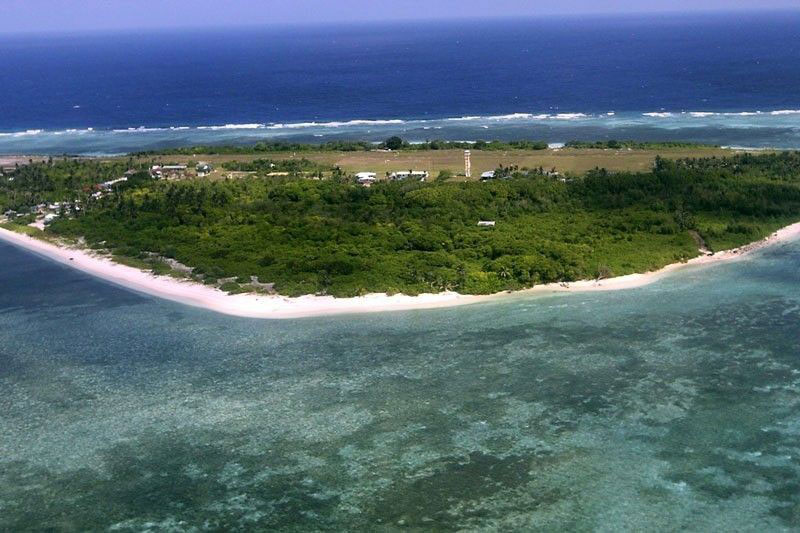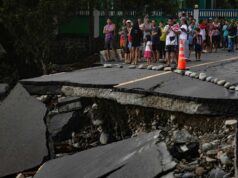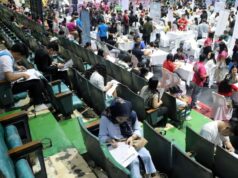Senators score China for coast guard’s ‘dangerous maneuvers’ near shoal

By Adrian H. Halili, Reporter
CHINA should be held accountable for its aggressive behavior in the South China Sea, Philippine senators said on Monday, after a recent incident between the Philippine Coast Guard (PCG) and Chinese Coast Guard near Scarborough Shoal.
“As China continues to undermine our maritime peace and stability, I call on the international partners to hold China accountable for its blatant disregard for the rule of law,” Senator Francis N. Tolentino said in a statement.
The PCG on Sunday said a Chinese Coast Guard vessel almost collided with the Philippine ship BRP Cabra, which was conducting patrols southwest of the disputed shoal which is controlled by China.
Mr. Tolentino, who heads the Senate committee on Philippine Maritime and Admiralty Zone, condemned the Chinese Coast Guard’s “reckless and dangerous maneuvers” against the PCG vessel.
“Not only did this aggressive maneuver endanger the lives of our brave maritime personnel, but it also constitutes a blatant violation of international law and the Philippines’ sovereign rights,” he said.
He added that Scarborough Shoal lies within the Philippines exclusive economic zone, according to the ruling of a United Nations-backed tribunal in 2016 and Republic Act 12064 or the Philippine Maritime Zones Act.
Senate President Pro-Tempore Jose P. Estrada, Jr. said the Philippine government should raise the issue with the International Maritime Organization as the Chinese Coast Guard “displayed a blatant disregard for maritime safety and international norms.”
“Our government should take decisive action by bringing this matter before the International Maritime Organization,” he said in a statement. “The incident was a clear violation of the Convention on the International Regulations for Preventing Collisions at Sea, to which China is a signatory.”
“By addressing China’s unending reckless and dangerous maneuvers against our maritime vessels, we can highlight the gravity of the situation which continues to threaten peace and security in the region,” he added.
Named after a British ship that was grounded on the atoll almost three centuries ago, Scarborough Shoal is one of the most contested maritime features in the South China Sea, where Beijing and Manila have clashed repeatedly.
China claims sovereignty over almost the entire South China Sea, a vital waterway for more than $3 trillion of annual ship-borne commerce, putting it at odds with Brunei, Indonesia, Malaysia, the Philippines and Vietnam.
A United Nations-backed tribunal in 2016 voided China’s claim for being illegal, but Beijing does not recognize the ruling.
Mr. Tolentino also raised concerns over the presence of a Chinese research vessel near Batanes province.
The Chinese research ship Zhong Shan Da Xue was said to be conducting a survey near the waters of Batanes province, Raymond M. Powell, a fellow at Stanford University’s Gordian Knot Center for National Security Innovation, said in an X post on Sunday.
“The presence of a Chinese research ship near Batanes, close to Taiwan’s coast, represents a deeply troubling concern that needs attention,” Mr. Tolentino said. “This action underscores Beijing’s increasing assertiveness in disputed waters, posing serious challenges to regional security.”
Batanes, the northernmost province of the Philippines, is expected to be one of the training areas for this year’s Balikatan (shoulder to shoulder) joint military exercises between Philippine and US armed forces.
“It is in this regard that I fully support any plan to include Batanes in the upcoming Balikatan exercises with the United States,” he said. “It sends an unequivocal message that the Philippines will not be intimidated. We must stand firm with our allies to protect our sovereignty and uphold international law.”
Chester B. Cabalza, founding president at think tank International Development and Security Cooperation in Manila, said that the Philippines should strengthen its defense partnerships with like-minded countries.
“While it is true that we have to make China account for their continued aggression in the West Philippine Sea, it is high time that we alter our strategy to strengthen our defense partnerships with like-minded countries to challenge Beijing,” he said in a Facebook Messenger chat.
Raphael J. Cortez, who teaches diplomacy at De La Salle College of St. Benilde, said condemning China for its continued aggression in the South China Sea could only provoke it.
“Such condemnation can never fully deter Chinese aggression, but instead may even serve as an impetus for them to do more,” Mr. Cortez said via Messenger chat.
He added that the support of other countries and the upcoming Balikatan exercises might not be enough to deter further action from China. “It seems like these actions are not tools of deterrence anymore for China but are catalysts for (them) to do more.”
TRAVEL ADVISORY
Also on Monday, Jose Manuel “Chel” I. Diokno, a party-list nominee for the midterm elections, said the Philippines should issue a travel advisory against China after the arrest of three Filipinos by Beijing’s state security on spying charges.
“We call on the Department of Foreign Affairs (DFA) to issue an immediate travel advisory warning Filipinos of the risk of arbitrary detention and false espionage accusations when visiting China,” he said in a statement.
“Our people must not be left vulnerable to being scapegoated in China’s hostage diplomacy,” he added.
The DFA and Chinese Embassy in Manila did not immediately respond to separate Viber messages seeking comment.
China’s Ministry of State Security arrested three Filipinos accused of engaging in spying activities, Beijing’s Global Times reported last week. They were accused of “intelligence-gathering” and conducting “covert intelligence missions” in Mainland China.
Their arrest came after Philippine authorities earlier this year apprehended a number of Chinese nationals accused of spying on joint Philippine-US military sites, the presidential palace and national headquarters of the country’s military and police.
China’s arrest of the accused Filipino spies could be a strategic move to pressure the Philippines into a prisoner swap for Chinese nationals detained for similar accusations, Mr. Diokno said.
“This bears all the signs of ‘hostage diplomacy’ or a ‘quid pro quo’ scheme. It is a dangerous tactic to force concessions from us,” he said.
“Our compatriots are being held hostage to secure the release of their citizens caught in the act of spying on our country,” he added.
On Monday, Malacañang said Philippine authorities will provide legal aid to the arrested Filipinos.
“Legal assistance will always be provided, along with all the necessary help and support,” Presidential Communications Office Undersecretary Claire B. Castro told a news briefing.
“There is no concrete evidence yet to confirm whether it is truly retaliation or part of retaliation by the other country,” she said. “We will not make such claims because there is no final investigation on this matter.” — with Kenneth Christiane L. Basilio



